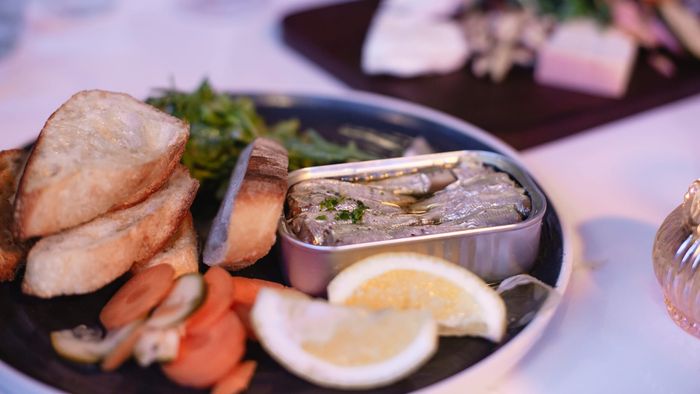NO-SIN TINS: Canned sardines have been called ‘nutritional superstars’ (Image: Linda Raymond/ Getty)
While fresh produce often takes the limelight, the humble tinned food aisle is frequently overlooked. Many shoppers associate canned goods with convenience rather than nutrition, but could these pantry staples actually be among the healthiest and most budget-friendly options available?
Six food and nutrition experts offered some surprising revelations, with each one pinpointing the same five budget-friendly ingredients as crucial for maintaining a healthy diet. Nutritionist Sarah Osborne said: “We mustn’t confuse convenience foods with fast food or junk.”
Experts advise avoiding certain canned items that are laden with added sugars, salt, or artificial thickeners, including many soups, ready-made pasta sauces, and baked beans that contain added sugar. Processed canned pasta meals are also discouraged due to their poor nutritional content, reports Wales Online.
MORE FOR CHEFS
However, there’s tremendous value in being creative with other ingredients, explained Steve Bennett, a PCI-Qualified Health Coach: “Tinned foods break down barriers to healthy eating by providing convenience, affordability, and long shelf life, while quality options like fish, tomatoes, and legumes retain their nutritional value.”
1. Sardines
Sardines are singled out by Steve as ‘nutritional superstars’ owing to their high protein content, omega-3 fatty acids, and calcium from edible bones. Sardines, along with other oily fish like mackerel and salmon, stood out as the top choice among expert recommendations.
Robbie Puddick said that whilst both tuna and sardines are excellent sources of protein and omega-3 fatty acids, sardines edge ahead nutritionally as they’re often tinned complete with bones, providing extra calcium, and generally have reduced mercury content. Tinned sardines are processed in a way that makes the bones soft enough to consume safely and easily, with no discernible texture.
Nutritionist Ann Garry highlights that the benefits of canned oily fish, including sardines, mackerel, or salmon, are substantial when you eat both the fish and bones, which contain abundant omega-3 fats vital for maintaining heart and brain function. They also offer an important supply of vitamin D and calcium.
Hannah Belsham, a health and wellbeing physiologist at Nuffield Health, calls sardines, which cost roughly 49p to £1.20 for a 120g tin across most British supermarkets, one of the most nutrient-dense foods available. They’re remarkably easy to prepare too – simply layer rye crackers with cream cheese, sardines, lemon juice, and chives for a tasty, protein-rich snack.
2. Chopped tomatoes
Tinned tomatoes are a kitchen staple and a fantastic source of antioxidants, particularly lycopene. Ann Garry says lycopene is “actually more available to the body once cooked or processed,” making canned tomatoes potentially “even better for you than fresh in some ways”. They also offer potassium, vitamin C, and fibre.
It’s worth stocking your pantry with tinned tomatoes, which can be purchased for as little as 39p for a 400g tin. Steve Bennett suggests it should be everyone’s ‘go-to base for quick sauces and stews’, advising that you can enhance the tasty product with fresh herbs, spices and garlic to maximise flavour.
Steve said: “One tip I learnt from Italian chef, Giancarlo Caldesi, is to buy tinned plum tomatoes whole, not chopped, as they contain less water and are often of a higher quality.”

3. Chickpeas
Chickpeas are widely recognised as a nutritional powerhouse. This type of legume (priced around 49p to £1 for a 400g tin) provides an excellent source of plant-based protein, fibre, and complex carbohydrates, making it perfect for sustained energy and digestive health.
Robbie Puddick, a nutritionist at Second Nature, says chickpeas help stabilise blood sugar and keep you fuller for longer. Hannah from Nuffield Health said that due to their high fibre content, chickpeas continue to benefit your digestive system by encouraging the growth of beneficial gut bacteria.
One way to consume chickpeas is through a pot of hummus, but be aware of its high fat content and added salt. Alternatively, you can add chickpeas to curries, stews, or sandwich fillings, or simply roast them and sprinkle them over salads for a boost of essential micronutrients like folate, iron, and magnesium.
- Tinned fruit
Often viewed with suspicion, tinned fruit can actually be a nutritious choice when chosen correctly, costing on average between 80p and £1.20. Robbie suggests that tinned fruits retain most vitamins and can be a great option if your fruit bowl goes empty, but they often come in syrup. He advises choosing varieties packed in water instead of syrup to avoid unnecessary additional sugars. Ann Garry advises choosing fruit tinned in its own juice rather than syrup and says it counts towards your five a day.
- Black beans
Black beans are incredibly nutritious pulses that offer protein, fibre, and resistant starch. Priced around 49p to £1.15 for a 400g tin, they’re excellent for improving gut health, managing blood sugar levels, and promoting cardiovascular wellness. Hannah Belsham notes they are packed with anthocyanins – antioxidants linked to improved cardiovascular health and reduced oxidative stress.
- Lentils
Lentils are another excellent source of plant-based protein and fibre, supporting digestive health, stable blood sugar levels, and heart health. Registered dietitian Vassiliki Sinopoulou praises lentils for their rich protein, fibre, and micronutrient content, and points out the convenience of not needing overnight soaking.
SUPER SOUPS
